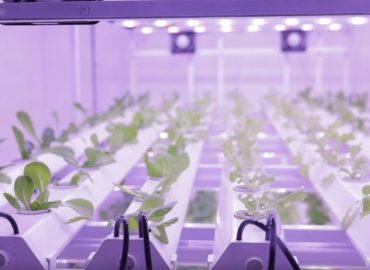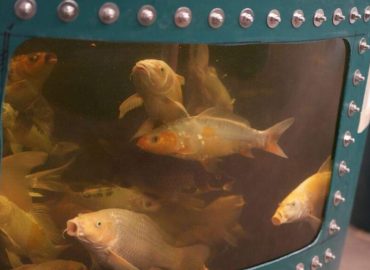Future Protein & Hydroponics To Help Food Independence in Barbados
UWI home hydroponics, flies-to-feed projects ‘to help cut food bill, boost farming
Future Protein & Hydroponics | Sheria Brathwaite |
Two innovative agricultural initiatives aimed at helping Barbadian households to cut grocery bills and small farmers to reduce production costs were launched by University of the West Indies researchers on Thursday, in a fresh, high-tech push towards sustainable food security.
The UWI Centre for Agricultural Research and Innovation (CAGRI) unveiled the IES HydroGen System and the FAO Black Soldier Fly (BSF) Larvae Project, branded Future Protein, as part of the university’s activities to mark World Food Day.
The initiatives are part of a deliberate effort to make agriculture more profitable, attractive and modern, said CAGRI’s director, Dr Michele Singh, during the launch at the Owen Arthur CARICOM Research Complex at Cave Hill.
The IES HydroGen System, developed through hands-on workshops and supported by a donation from Infinity Energy Solutions, represents a breakthrough in democratising food production by making high-yield, water-efficient farming accessible to households and communities.
While hydroponics empowers households to grow more of what they eat, the Black Soldier Fly (BSF) Larvae Project — branded Future Protein — tackles the region’s dependency on imported animal feed and its mounting organic waste problem. The common fly’s larvae are turned into feed and fertiliser.
Hydroponics — a soilless and highly efficient growing method to cultivate crops in nutrient-rich water — reduces water use by up to 90 per cent compared with traditional farming. It includes two complementary setups: the nutrient film technique (NFT) and the drip-to-waste systems.
“What you see today is the hydroponics system, and it’s nothing new to Barbados,” said CAGRI’s Dr Michele Singh. “But what makes us different is that we’ve made it into a scale-adoption, easy-type process where the average person could install a system like this in their yard or garden. It’s a landless, soilless, waterless system of growing crops.
“When we did our calculations, one of the units — the nutrient film technique — can decrease your grocery bill by up to 30 per cent.
“The system you see outside grows 35 plants — that’s seven batches of five of anything. You can grow your lettuce, chives, thyme, parsley, marjoram, or even Chinese cabbage. The drip system can handle bigger plants like tomatoes, cucumbers and bell peppers, which could significantly impact household grocery expenses.”
Each unit costs roughly $1 500 to $2 000 depending on assembly and setup, and CAGRI plans to make the systems more affordable through national suppliers.
“The average cost for that retail, because we purchased the materials using donor funds, is about $1 500 to $1 600,” Dr Singh explained. “We are trying to work with suppliers so that they could supply the things at a more affordable cost but have everything in one place. The average person could go there with a list that we provide and buy the materials, or we could purchase, assemble and install it at your home.”
She described it as a “one-stop, turnkey operation” that includes the necessary fertilisers, seedlings and even installation.
More than 375 people have already been trained under the initiative, turning scientific research into tangible national resilience.
Developed in partnership with the Ministry of Agriculture, Food and Nutrition Security (MOAFNS) and the FAO, the black soldier fly project is hosted at UWI’s CAGRI facility, where a BSF colony is being raised under controlled conditions.
“That little guy in those jars will transform the way we feed our animals,” Dr Singh said. “Of course, there are people who will say, ‘I’m not feeding my chickens worms.’ But guess what? You buy a bag of feed that contains protein — and those little larvae are 40 to 60 per cent crude protein. It is the highest source of protein, and it comes from an organism that occurs naturally in your environment.”
The black soldier fly is native to Barbados and does not transmit diseases.
“If you walk around your garbage bins or compost heaps, you will actually see the adults,” Dr Singh explained. “The black soldier fly does not have mouthparts; it does not transmit disease, so there’s no need to fear it.”
The larvae rapidly convert organic waste into two valuable products — a protein-rich animal feed and a nutrient-dense organic fertiliser known as frass. Together, they create a circular bioeconomy model, reducing the island’s food import bill while managing waste sustainably.
“Basically, these two projects are about cutting costs, introducing technology, reducing costs, and making agriculture sexy by helping farmers make more money,” Singh said.
Dr Singh also noted that the university is now taking a leading role in aligning academic training with real-world food system needs.
“This is the first time that anything related to agriculture and food is being offered through the University of the West Indies,” she said. “We’ve recently launched our minor in food science [programme], and there is a demand for over 9 000 new employees in the hospitality industry. Where are those persons going to come from? How are they going to be trained?”
Dr Singh described CAGRI as “a knowledge translation centre” which translates the science of agriculture into bankable businesses. “We do that by reaching out and working directly with the beneficiaries — and that is the farmer,” she added.
“How can we help a farmer adopt a technology? By adopting a technology, [his endeavours] will become more profitable.
“There is only one way to make agriculture attractive, and that is to sexify it. We need to make it sexy. How do we make it sexy? Let us make money. Making money in agriculture is the most powerful attractant to any investor or any young person.”
CAGRI is also preparing to roll out a series of short courses in butchery, food safety, hygiene, product development and meat cutting, aimed at building a new cadre of trained, skilled professionals for food and agriculture.
Original Article: https://barbadostoday.bb/2025/10/16/uwi-home-hydroponics-flies-to-feed-projects-to-help-cut-food-bill-boost-farming/
The post Future Protein & Hydroponics To Help Food Independence in Barbados appeared first on GROZINE.



